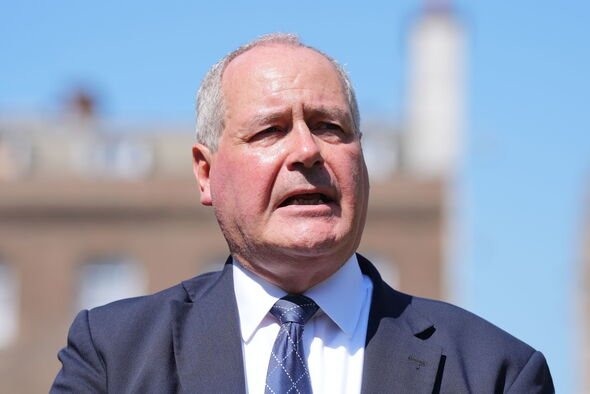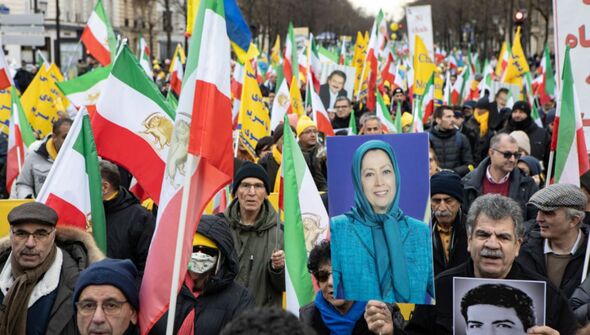 OPINION
OPINION
Bob Blackman MP (Image: Jonathan Brady/PA Wire)
On June 30, 2018, I unknowingly found myself within the line of terrorist fire of the Islamic Republic of Iran when I attended a massive rally that had been organized near Paris by the National Council of Resistance of Iran. As I later found out, while tens of thousands of NCRI supporters were cheering the cause of regime change by the Iranians and democracy in that country, European law enforcement were thwarting a bomb plot, masterminded by an Iranian diplomat-cum-terrorist which illustrated the Iranian regime’s willingness to target dissidents on European soil, even when doing so also threatened the lives of hundreds of Western lawmakers, including a cross-party delegation of British MPs.
Since then, the task of managing threats from the Islamic Republic has only grown more serious. Tehran has intensified its drive to acquire nuclear weapons. Its role as the “head of the snake” of terror and belligerence throughout the Middle East has become increasingly evident. Its terror networks have even extended to our own soil in the form of plots against dissidents. But one feature of the Iranian regime stands out: it is likely the only state in the world that takes Westerners hostage as an official policy, approved and pursued at the highest levels of government.
While addressing Iran’s national security threats is crucial, we must not forget the European citizens, including British nationals, who remain hostages in Iran. The unconditional and immediate release of our citizens must be central to any negotiations with this ruthless regime.
However, experience over the past four decades has proven one undeniable fact: the UK — or any other Western country — must not appease the ayatollahs or make concessions to secure the release of hostages. This must be made clear to Tehran from the outset.
One of Tehran’s consistent tactics is to use hostages as bargaining chips, pressuring European governments to demonize or restrict the democratic Iranian opposition coalition, the National Council of Resistance of Iran (NCRI), and its President-elect, Maryam Rajavi.
Caving to such demands is not only morally wrong but also politically and strategically misguided. These concessions embolden Tehran, reinforcing its 46-year-long strategy of hostage diplomacy and repression. From a strategic standpoint, this approach could not come at a worse time. The mullahs are facing growing domestic dissent, severe regional setbacks, and a shattered economy on the verge of collapse. They are at their weakest point and are in no position to impose their will on the West. While slandering the NCRI has made no dent in its popular support among Iranians or its international recognition, it has encouraged the regime to intensify its suppression.
The tragic reality is that some European governments have repeatedly fallen into this trap in recent years. While protecting our citizens should be a collective priority, the actions of some European states have been counterproductive.

Protest in Paris in support of Maryam Rajavi, the president-elect of the National Council of Resista (Image: Getty)
France stands out. A case in point is the French government’s recent, shameful deal to secure the release of Olivier Grondeau, a French tourist who was imprisoned in Iran for 900 days.
His release was preceded by a wave of fabricated allegations and slander in a French satirical weekly aimed at Mrs. Rajavi, based on disinformation apparently provided to the publication by elements within the French intelligence community. This disgraceful pattern exemplifies how some Western governments, rather than standing firm against Iran’s blackmail, enable it by undermining its main opposition.
While I, like any sensible person, wholeheartedly welcome the release of hostages, the use of slander, character assassination, and baseless legal cases against the Iranian Resistance only emboldens the regime, encouraging it to escalate hostage-taking and intensify repression. Clearly, these tactics are not isolated incidents, but part of a broader strategy designed to weaken the organized opposition and suppress dissent.
The consequences of this misguided approach were evident in the case of Assadollah Assadi, the Iranian diplomat-cum-terrorist who spearheaded the plot to bomb the grand gathering in Paris in June 2018. The primary target of the attack was Mrs. Rajavi, Tehran’s foremost adversary, who was the keynote speaker. The gathering included tens of thousands of NCRI supporters and hundreds of international dignitaries, including prominent Americans.
Assadi was arrested a day after the event and later extradited to Belgium, where he was sentenced to 20 years in prison for plotting to commit terrorist murder. But shockingly, after serving less than a quarter of that sentence, he was handed back to Tehran in a prisoner exchange. On his return to Iran, he was given a hero’s welcome.
Every instance of compromise by Western governments reinforces the regime’s belief that it can manipulate the international community through blackmail, terrorism, and disinformation campaigns against its opposition.
As a unified policy, we must reject the notion of sacrificing the democratic opposition — particularly the NCRI and the People’s Mojahedin Organization of Iran (PMOI/MEK) — to appease a regime that thrives on blackmail and lies.
Instead of appeasement, we must increase pressure on Tehran. The regime should face harsher sanctions and greater international isolation if it does not release our hostages immediately. Simultaneously, we must stand unwaveringly with the Iranian Resistance and Mrs. Rajavi, supporting her relentless efforts and leadership in the fight to end dictatorship in Iran and establish a free and democratic republic.
The UK and France have stood together against tyranny before. During World War II, Charles de Gaulle took refuge in the UK to lead the resistance against German occupation. No patriotic Frenchman would have tolerated restrictions on General de Gaulle or slander against him to appease Hitler. We should remember the wise words of Winston Churchill: “An appeaser is one who feeds a crocodile — hoping it will eat him last.” History proved him right.
Bob Blackman, Conservative Party MP for Harrow East, is the Chairman of the 1922 Committee

